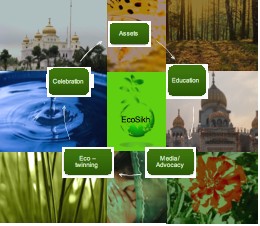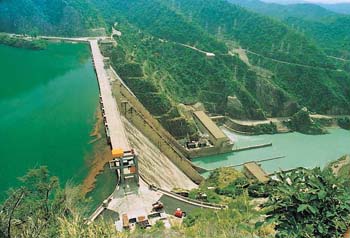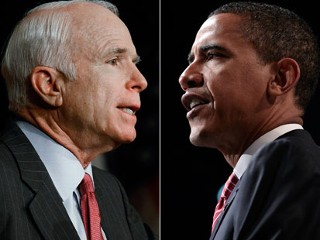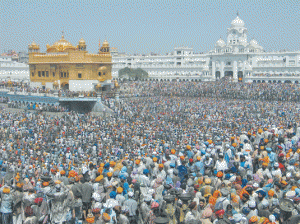
Coblogged by Camille and Reema
This week is Energy and Environment week. The environment has been front page news for a while now and one Sikh group is getting involved. 
Recently, SCORE launched a new initiative called EcoSikh, a project driven towards promoting environmentalism and environmental stewardship particularly in Punjab, but in the Sikh community at large. EcoSikh is the Sikh contribution to a larger project between the UNDP and the Alliance for Religions and Conservation (ARC, a UK-based NGO). UNDP and ARC are funding many religious communities to develop plans and ideas to integrate environmental consciousness into their members’ communities and personal behavior.
The program plans to work through 5 areas it has identified as: assets (using existing skills, time, resources for environmental projects), media/advocacy, eco-twinning (developing relationships of mutual benefit between various Sikh communities by sharing environmental ideas), celebration, and education. Each of the 5 program areas has been rooted in Sikh theology as a reminder of the historic import and connection with the environment in the Guru’s bani. A draft of the plan can be found here.
 International news outlets are a flutter with the latest: in the wake of an unseasonably hot, dry summer, the Bhakra Beas Management Board has decided to cut irrigation water to Punjab, Rajasthan, Haryana and Himachal Pradesh. The Punjab government has tried to alleviate the demand for water by curtailing its use of electricity, as well (many segments of the state run on hydroelectric power). Officials have a delayed monsoon has kept the reservoir behind the dam from being recharged. They insist the heat, and dryness, are unrelated to El Nino and a number of other weather-related phenomena.
International news outlets are a flutter with the latest: in the wake of an unseasonably hot, dry summer, the Bhakra Beas Management Board has decided to cut irrigation water to Punjab, Rajasthan, Haryana and Himachal Pradesh. The Punjab government has tried to alleviate the demand for water by curtailing its use of electricity, as well (many segments of the state run on hydroelectric power). Officials have a delayed monsoon has kept the reservoir behind the dam from being recharged. They insist the heat, and dryness, are unrelated to El Nino and a number of other weather-related phenomena.
But what if the impending drought and the water shortage are products of a more permanent weather shift? What if they are related to climate change?
From the Volokh Conspiracy:
Dear Senator McCain:
Repeatedly calling me and everyone else in the United States “my friends” is extremely annoying. In part, it’s just an irritating phrase. Beyond that, I’m not your friend. I don’t know you, and, from what I know of you, I don’t even really like you. Sorry to focus on such superficialities when the world economy is going to Hell, but you probably lost more votes with your constant repitition of “my friends” than from anything Obama said.
Sincerely,
David B. [link]
 Reema (I’m signing on.)
Reema (I’m signing on.)
Both candidates used the phrase. And of course, because of my bias, it grated on my nerves when McCain used it. It was just amusing when Obama did. Anyone who is about to control my life and the lives of all US residents is not a friend, and they shouldn’t try to be. They just better know what they’re doing because everything (economy, environment- one in 4 mammals is threatened with extinction, social security, Medicare + Medicaid) seems to be falling apart at the same time. Not to be dramatic or anything. The only suggested economic solution from a Sikh point of view I found was vague, overly ambitious, and not really very palatable either.
Time magazine recently named Balbir Singh Seechewal amongst its “Heroes of the Environment 2008.” The acknowledgement highlights the work of activists such as Balbir Singh and shows how their passion and innovation can positively impact the environment. Balbir Singh is described as “the Sikh who cleans the corrupted rivers of India,” and he is accoladed for his work of cleaning the historic Kali Bein river. The 99-mile-long river, in the Hoshiarpur district, is considered historically significant because Guru Nanak Dev Ji was said to have received enlightenment after taking a dip in the Kali Bein river. However, due to years of neglect, the river has become a containment of waste,
Over the past couple of decades it was reduced to a filthy drain into which six towns and more than 40 villages emptied their waste. Parts of the river dried up, leaving neighboring farmlands parched. Its polluted waters also seeped underground, contaminating the groundwater and causing lethal diseases.
 In 2000, Balbir Singh and inspired volunteers decided to use the concept of kar seva (voluntary service) to physically clear the entire riverbed and build riverbanks and roads alongside the river. In addition, they educated the locals via a public-awareness campaign on how to keep the river clear of waste. Today the river is not only cleared of sewage, but the natural springs have been revived and the river is once again flowing.
In 2000, Balbir Singh and inspired volunteers decided to use the concept of kar seva (voluntary service) to physically clear the entire riverbed and build riverbanks and roads alongside the river. In addition, they educated the locals via a public-awareness campaign on how to keep the river clear of waste. Today the river is not only cleared of sewage, but the natural springs have been revived and the river is once again flowing.
As we join others in praising Balbir Singh and his volunteers for what they have accomplished with the Kali Bein river, I also want to highlight the concept of Kar Seva and take the liberty to ask if we do enough of it? The most famous examples of Kar Seva occurred at the Darbar Sahib in Amritsar. I have seen pictures and videos of the last Kar Seva which occurred in Amritsar – and I have to admit, I don’t think words can describe the power of those images.
We seem to be pre-occupied with building new gurdwaras (yes, I know – that’s a whole other issue), but i mention it to simply say that as a community, we don’t do a very good job at sustaining our current establishments. Whether we speak of our historic gurdwaras in Punjab (both East and West Punjab) or if we think about our gurdwaras here in North America – there is a lot of Kar Seva which can be done. After seeing the images of Kar Seva at the Darbar Sahib, it is amazing to me how our community can mobilize itself to such an extent and peform such an incredible act. And yet, in many communities and at many gurdwaras, we struggle with keeping the kitchen clean or the trash picked up. Can Kar Seva exist outside of Punjab? It just makes you wonder….
